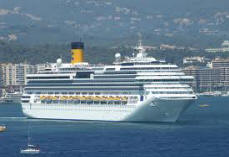 SHARES
in the company behind the cruise ship Costa Concordia
collapsed almost 17 per cent yesterday after it warned the
disaster would cost it up to $95 million (£62m) this year
and may lead to other financial set-backs.
SHARES
in the company behind the cruise ship Costa Concordia
collapsed almost 17 per cent yesterday after it warned the
disaster would cost it up to $95 million (£62m) this year
and may lead to other financial set-backs.Carnival Corporation, which is listed in both London and New York, was the Footsie’s biggest faller after analysts warned the catastrophe could have a serious effect on the firm’s bookings.
There are also fears about the impact on the wider industry as the tragedy coincides with a key period for cruise operators, when the majority of advance reservations are made.
Analysts at Morgan Stanley warned that Carnival could face a far greater hit than the $85m-$95m quoted if investigations into how the luxury cruise liner capsized after hitting rocks off the Tuscan island of Giglio result in more stringent safety requirements. The analysts said the final bill could be “materially worse if the investigation finds industry safety standards need improving or if consumers stay away for a prolonged period” and slashed their target price on the stock from 2,700p to 1,800p.
Carnival shares traded on the London Stock Exchange closed down 16.5 per cent, or 370p, last night at 1,878p.
Micky Arison, chairman and chief executive of Carnival, released a statement saying the company was “deeply saddened by this tragic event” and that the Costa Concordia was undergoing a damage assessment but was likely to remain out of service for the rest of the fiscal year “if not longer”.
In addition to the $85-$95m hit to 2012 revenues, Carnival said it was anticipating “other costs to the business that are not possible to determine at this time”.
The parent company of Costa Cruises, which operated the Concordia, also revealed it had insurance cover for damage to the vessel “with a deductable of approximately $30m”. Its third party personal injury liability insurance is “subject to an additional deductable of approximately $10m for this incident”.
Carnival self insures for the loss of use of one of its vessels.
Italian newspaper Il Sole 24 Ore yesterday quoted an insurance broker saying that the company had cover totalling around €450m (£372m) while its cover for liability costs reached around $3 billion.
Wyn Ellis, an analyst at Numis Securities, said the disaster will undoubtedly have a knock-on effect on the wider industry this summer – particularly as January is such a key booking period for cruises.
However, he believes the damage will only be short-term. “There will be a definite short-term impact because it’s a key booking period and many people will be put off cruising in the short term,” he said.
But Ellis added: “I think people have very short memories. This summer’s going to be awful but in terms of the long-term valuations and the fundamentals of the industry I think the impact will be marginal.”
Analysts at Standard & Poor’s said: “There is the potential that this event could weigh on booking trends across other cruise brands.”
Carnival and Oslo-listed Royal Caribbean dominate the global cruise market, together accounting for around three-quarters of sales.
In Europe alone the industry is worth more than €35bn.





